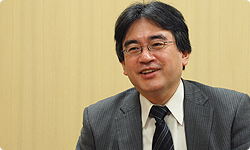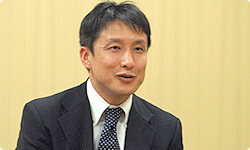2. Software Attracting the Attention of Researchers
Could you tell me about the nature of your research between starting work at the National Institute of Health and Nutrition and becoming involved with Wii Fit?
I did research into the effects that exercise and physical activity had on the various risk factors for cardiological illnesses, in particular heart disease and strokes.
I see.
I focussed especially on the hardening of arteries, doing research to determine whether or not exercise and physical activity had a beneficial effect on this.
What sort of results did that research yield?
The generally-held belief is that exercise serves to prevent illnesses such as heart disease and that, at the same time, it makes arteries less hard. But unfortunately, what I discovered while doing a whole range of research was that it’s not the case to simply say that any type of exercise is beneficial.
So it depends on the type of exercise?
That’s right. So for instance, American Football players use training machines to build up their upper body strength. When they do that sort of training, they focus all their strength …
They hold their breath, which means that they aren’t using oxygen.
They aren't using oxygen. If you really devote yourself to that kind of anaerobic muscle training, your arteries will actually harden.
So it will actually serve to harden the arteries?
Right.
So in order to boost health, muscle training is not necessarily…
Well, not all of its effects are beneficial. Of course, it's not true to say that it’s all harmful - there are plenty of benefits to be gained by doing it.
You often hear that if you don’t have a lot of muscle, basal metabolism drops which can make weight gain more likely. That means that while muscle training may be important, just doing exercises where you hold your breath is not a good idea.
Right. You shouldn’t just do those types of exercise. Lots of people have been kind enough to show interest in my research into this matter and when putting together guidelines for training exercises, they have to some extent abandoned the misconception that all exercise is necessarily good for you. I think that the importance of gathering objective evidence to determine which types of exercise are good and which are bad has begun to gradually sink into the general consciousness…
You’ve just casually used the word “evidence”. (laughs)

(laughs)
We do not hear that term in our daily lives very often. In the medical world, I understand that evidence refers to doing practical tests and gathering statistics on the physical causes and effects which result in order to provide proof to back up your conclusions.
That’s right.
Is my understanding correct?
You’ve got it in one!
There is also the term EBM, standing for “evidence-based medicine”.
Right. It refers to medicine based on evidence gleaned from academic research. So there is that manner of thinking. However, academics have a tendency to look at what they’ve researched and state: "This is the correct answer!" However, I have a duty to check my own research with a sceptical eye: “Is what Miyachi claims actually the case?” This means that I have to be aware of what every other researcher is doing and what kind of data they are producing. By gathering all of this, I can begin to see what the correct way to proceed is.
I see. Now, to change the subject somewhat, I’d say that there are many people who, while they played sports at one time, once they are adults they become busy and simply haven't got time to do exercise. But once they get a chance to exercise again, they reacquaint themselves with how good it feels to work up a sweat.
Yes, I think that’s right.
With that in mind, it would seem to me that somehow providing the motivation to get people to exercise even once could prove to be really significant. From the perspective of your research, what would you say about this?
From the point of view of those of us doing research in the field, this is actually the most difficult area to understand.
Is that right?
We can’t fathom the reason why some people take that first step and begin exercising, or put the other way round, why some people just don’t want to do exercise. That’s why we end up offering guidance only to those people who want to exercise, for instance...
And that just means that people who were already healthy become even healthier…
And people who aren't like that remain unhealthy.
It’s very difficult to create those opportunities…
Moreover, we don’t really understand the physical mechanism that determines why people who may have done a lot of exercise in their youth just don’t want to exercise once they reach adulthood.
That would entail looking at people’s emotional make-up and the strength of their willpower which are relatively...
…it may well entail elements that are tied in with study of the brain and psychology. However, for instance, substances such as nicotine in cigarettes trigger the desire to smoke. But we really don’t have any idea what factors influence the desire to do physical exercise. So in spite of not knowing what this mechanism is, we are still trying to come up with ways to get more people doing exercise.
It’s something that I’ve always found very mysterious. If you find yourself unable to exercise for a while and then do a little, you’ll remember that it feels incredibly good and, more often than not, you'll decide that you want to do it again.
Perhaps at times like that, there is some kind of substance inside you…
I wonder just what it is! (laughs)
There may be some kind of substance being produced or your brain may be recalling that feeling of pleasure making you realise that continuing to do this would be enjoyable. But I do think that there is probably some sort of substance at work in all of this.

It does seem a little strange to me that you’d want to work up a sweat and tire yourself out deliberately in the first place.
There is something strange about it. I don’t think you’d be able to do something like that unless there was something acting on your body. I don't know what that might be, but I've given it my own name: "rakutin".
“Rakutin”? From the word “rakuchin” (a term that means “pleasurable” or “taking it easy" in Japanese)? (laughs)
That’s right! (laughs) With appetite, research has confirmed that, to put it simply, after a good meal when you feel full, a hormone called leptin is released. The part of the brain known as the satiety centre controlling the stomach is stimulated so that people don’t feel they need to eat any more. So that’s where I got the term “rakutin”. When people want to take it easy, a certain substance may be released and people no longer want to do exercise. So if we could somehow inhibit the working of this “rakutin”, people would feel a strong desire to exercise!
(laughs)
So just what is this “rakutin”…? It may actually be conversely a molecule which makes you want to do exercise, or it could be a type of molecule that makes you not want to do exercise. I’m not sure what it is, but I think it’s vital that we researchers find out. I think that the work I’ve been doing is actually a chance to further pursue this.
By which you mean?
Software like Wii Fit has a great potential to motivate people to become physically active. By investigating just what changes their brains and bodies are going through, we may be able to uncover just such a molecule as “rakutin”. In other words, by looking at it from the viewpoint of humans altering their behaviour, Wii Fit as well as the Wii console itself holds interest for researchers like myself.
